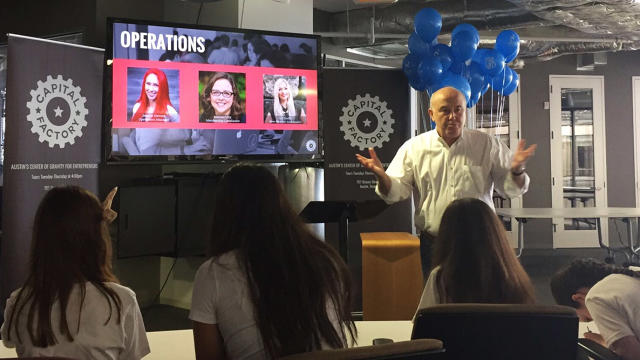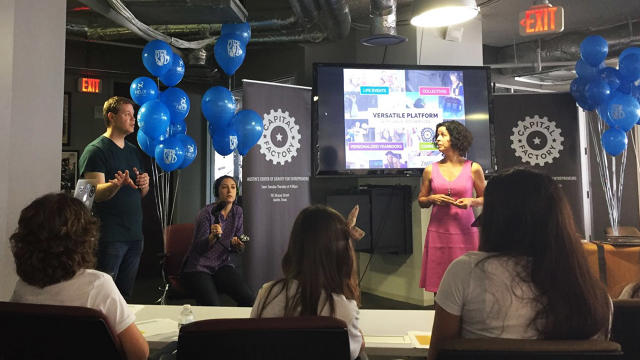Five Lessons Kids Can Teach You About Pitching Your Startup
If you can’t explain your business model to kids, then you’re not ready for prime time in front of investors. That’s the idea behind Pitch-a-Kid, a new Austin, Texas-based organization that puts kids in the judge’s seat as they analyze adult entrepreneurs’ pitches and choose the strongest pitch of the bunch.
Kids learn critical thinking and problem-solving skills, while local entrepreneurs get an unfiltered assessment of where their pitch falls short and what parts might be confusing. “Kids at the elementary school age are very honest and are comfortable asking questions about things they don’t understand,” says Mike Millard, who started Pitch-A-Kid earlier this year with his daughter Audrey, who’s currently in fourth grade. “For the entrepreneurs it really pushes them to use simple, straightforward, and understandable language.”
At Pitch-a-Kid’s second pitch session on July 30 at Austin’s Capital Factory, there were five judges and a judge coordinator ranging in age from fourth to twelfth grade. Millard’s daughter acted as an alternate judge and microphone runner.
Stakes weren’t that high for the six presenters because there is no cash prize for winning. However, each had only five minutes to present their plan before the judges started asking challenging questions including: How much money do you make? How do customers find you? How old were you when you started your business? and, Why do you do this? Presenters also had to field questions from the audience.

1. Tell Stories.
The judges awarded top honors to Zuby Onwuta’s pitch for Think & Zoom, which provides hands-free visual magnification for low vision sufferers. Onwuta at least partly attributes his win to storytelling. He opened with a personal story about his own struggles with macular degeneration, then demonstrated his product’s capabilities.
“With any pitch, the entrepreneur has to find a way to take the audience through the journey so the audience can easily relate with the idea or the problem that is being solved,” Onwuta says. “I told the story of when I was a high school student, so they could relate with my plight.”
In pitching UnaliWear, whose voice-controlled watch provides medication reminders, fall detection and emergency assistance, CEO Jean Anne Booth described how her aging mother inspired her to create an alternative to traditional medical alert gear. The kids instantly understand how the technology might benefit their grandparents or other relatives. “When entrepreneurs realize that you have to tell a short story, they do well with both kids and grownups,” Booth says.
2. Use Analogies Your Audience Understands.
Entrepreneurs often describe their business as the Uber of (fill in the blank) or the Airbnb of (fill in the blank). But if your audience isn’t familiar with the other platform, the analogy can fall flat. In pitching his startup CoachTube, founder/CEO Wade Floyd compared it to other online educational platforms like Udemy but for sports, which baffled at least one of the judges. “I did not realize kids, and actually most non-techies, have never heard of those platforms,” he says.
At a previous Pitch-a- Kid event, Joe Milam pitched AngelSpan, which provides investor relations for startups. Investor relations isn’t in most kids’ vocabularies, so Milam compared it to keeping parents or grandparents informed about progress at college. “You are bright kids and most of you will end up going to college,” he told the crowd. “[Your family is] rooting for your success, but they’re going to want to hear from you. Startups are the same way. They need outside help from people who want to see them succeed.” Milam says that comparison resonated with the kids.

3. Don’t Talk Down To Them.
While relatable analogies helped the Pitch-a- Kid presenters connect with their audience, none of them simplified their pitch to the point where it felt patronizing. “I thought it was important not to talk down to them; after all, they’re there on a Saturday because they’re interested in being there,” Booth says. “At the same time, if our story can’t be told that easily, then it’s too complicated for investors as well.” She says the only adjustment she made for the Pitch-a- Kid audience was omitting information that would be have been more appropriate for accredited investors.
4. Know Your Why.
Kids often ask why, and it’s a smart question for entrepreneurs to ask themselves, both for self-knowledge and for explanatory purposes when pitching angel investors or VCs. “Entrepreneurship can be extremely challenging with 100-hour weeks, rejection, extreme change in income and lifestyle early on,” Floyd says. “If you don’t have a deep passion for what you are building you will fail.”
When asked why he created CoachTube, Floyd joked that “my mom didn’t buy me a video on becoming a better baseball player,” then more earnestly replied, “I’m very passionate about online learning. I wasn’t very good at sports so that’s why I’m an entrepreneur.”
5. Keep It Short.
Pitch-a- Kid keeps presenters to a strict time limit, which keeps the event moving along and minimizes restlessness in the kids. But it’s also smart for entrepreneurs to stay succinct. “Most VCs and angel investors have less of an attention span than your average kid,” Booth says, “so if you can’t light them up quickly, it’s not going to happen at all.”
Susan Johnston Taylor has covered personal finance and business for publications including the Boston Globe, Entrepreneur.com, and USNews.com.
Fast Company , Read Full Story
(28)













